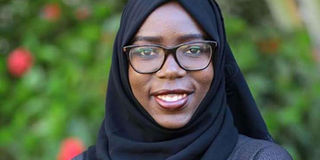What it has been like fasting during Covid-19

Amisa Rashid Ahmed talks about her Ramadhan experience. PHOTO | COURTESY
What you need to know:
- With the 7pm curfew in place, one has to ensure that iftar finds them at home. There are no more invites.
- It should have been a month of serenity but it has become a lot about anxiety and uncertainties because of the pandemic.
For millions of Muslims, Ramadhan means no eating, drinking, or snacking from sunrise to sunset for 30 days.
People then meet to break the fast every evening and eventually celebrate Eid Al Fitr as a community. But with a ban on social gatherings, things are different this year. Amisa Rashid Ahmed talks on the highs and lows.
"On a particular day in the future, I am going to look back to this year and a Muslim next to me will exclaim, Ya Allah! They will be referring to this Ramadhan season.
I have been around for 26 years and as long as I can remember, I have always looked forward to the Ramadhan period longingly.
The Ramadhan month, which started on April 23 and ends this week, is very pivotal in our journey of faith.
During this season, we do not eat food or drink any beverages, even water, from sunrise to sunset. It is a season that most Muslims work on their holiness — devoid of any anger and toxicity.
Myself, I ward off toxicity by reducing my time on social media. But besides fasting and seeking piety, this is usually a happy month for me.
My calendar, especially, is normally full. I will have had dinner at a friend’s home one night and then have relatives come to our home the following night.
When we gather, we stuff ourselves with all manner of foods and juicy stories. Having fasted from dawn to dusk, we deserve that, right?
FULFILMENT
I used to wake up early during Ramadhan and help my family prepare for iftar — the meal is taken to break the evening fast.
Ingredients check. Dough check. Leave it to rise for some hours then prepare snacks, such as samosa and mahamri. If we are hosting the iftar, then add chicken biryani and pilau on that list.
I am a psychologist by profession and I am involved in many voluntary community activities around Kibera. If its the time for iftar, and I am caught up, no worries, local mosques are set in prayers and abundance of food.
I could have just popped into one and had my fill. Now the local mosques are closed and community iftars are not happening.
This is usually a good time for us Muslims from the Nubian community, one of the marginalised communities in Kenya to come together.
The best religious activity that keeps me going throughout Ramadan is the night prayers, Tarawih, which are after the iftar whereby we congregate at the mosque and perform three-hour-long prayers — tiresome but productive. At the end of the prayers, I feel some sense of fulfilment. I glow.
NO COMFORT
But this year’s Ramadhan is far from what I had envisioned. For starters, this is the first Ramadhan that I have broken my fast at home.
With the 7pm curfew in place, one has to ensure that iftar finds them at home. There are no more invites.
The night prayers, which are enriching when said as a congregation are no more. It has been difficult to pray at home.
At the mosque, an Imam is leading so when you get tired, you can take a short break and join others later. Now I have to be my Imam.
Whenever I try it, I get exhausted by midway. Also the aspect of togetherness during prayers is no longer there.
The Covid-19 has really upended our lives and most definitely negatively impacted this fasting period. We are bombarded with information – whether fake or true - and it's overwhelming.
It should have been a month of serenity but it has become a lot about anxiety and uncertainties because of the pandemic.
But you know what is even more distressing? Due to the ban on social gatherings, we will not attend communal prayers or mark the festival of Eid al- Fitr communally like we have always done. This is the highlight of the Ramadhan.
WELFARE ACTIVITIES
We close our businesses to usher in the new month of Shawwal. This week, we would have flooded the Eastleigh market shopping for new fancy clothes, presents, spices, and food to give to the less fortunate. This will not happen.
My services have been critical especially during this time when most people are at home.
I run an organisation called Nivishe and I have been working tirelessly on providing psychosocial support at the grassroots level for gender-based fiolence victims in Kibera and running a food drive for the needy.
As such, I have not taken enough time to slow down and reflect on life which is among the main actions of Ramadhan.
But when I flip it, it is a positive aspect of my 2020 Ramadhan since I have given myself to fully serving the community, and being thus engaged, it has made fasting easier since I don't get hungry at noon like previous Ramadhan months.
The charity has great virtue and reward. The prophet reminds us that even by giving a half date in charity, we shield ourselves from hellfire.
Also, I believe that when we celebrate next year’s, I will be many steps ahead of understanding the holy book of Koran since I have increased the recitations and I can pray by myself albeit not for three consecutive hours."





